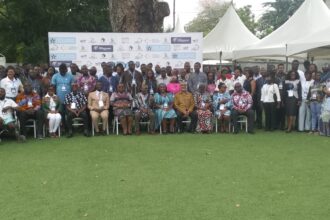Ghana’s macroeconomic performance improved in 2017 after a difficult 2016. The country’s economy expanded for the fifth successive quarter in September 2017; at a rate almost double that of 2016, according to a World Bank report released today.
The 3rd edition of the Ghana Economic Update, which focuses on agriculture as the engine of growth and jobs creation, notes that the service sector bounced back, and the fiscal consolidation is paying off. The inflation rate is also down to close of 10 percent.
“The macroeconomic outlook was largely positive based on the 2017 performance. GDP growth for 2017 is estimated to have almost doubled from the 3.7 percent in 2016, and is expected to stay at that elevated level through 2018,” said Henry Kerali, World Bank Country Director for Ghana.
The external position has improved as the trade balance has shifted to a surplus. Ghana has made good progress in macro-stabilization in 2017, but it needs to sustain the fiscal consolidation efforts. According to the report, inflation is likely to fall within or be close to the Bank of Ghana’s medium-term target range of 6-10 percent in 2018. Based on the 2017 trends, and sustained fiscal consolidation, the report expects that the fiscal deficit could fall within the Government’s target of below 5 percent of GDP from 2018 onwards. To sustain the fiscal consolidation efforts, two areas are particularly important over the medium-term—domestic resource mobilization and expenditure controls.
Despite the positive outlook, challenges remain, including further containing inflation and strengthening and deepening the financial sector to lower interest rates. Ghana’s economic performance over the medium term will, to a large extent, depend on the success of the economic stabilization program. The report recommends that the Government sustain the fiscal consolidation efforts. Improvements in domestic revenue mobilization and more forward-looking expenditure planning will be key. But fiscal consolidation will only be sustainable when social and economic activities can thrive in an expanding and increasingly diverse economy. Ghana is also likely to face higher financing costs in both the domestic and external markets in the context of a strong U.S. dollar and rising global bond yields.
“The country’s heavy reliance on primary commodities, including cocoa, gold, and oil—all prone to volatility in international commodity prices—create uncertainty about its actual future paths for growth, inflation, export receipts, and domestic revenue,” said Michael Geiger, Senior Economist and co-author of the report.
The report highlights that with the right reforms, agriculture has the potential to be one of the leading sectors for a more diverse economy and can be transformed to be an engine of growth and job creation. Agriculture has a very large multiplier effect on employment, creating over 750 jobs for every additional $1million of output. However, as the importance of the extractive sector has risen, it appears agriculture sector growth has slowed.
The report therefore recommends three policy options to strengthen the agriculture sector:
- Improving the quality and effectiveness of public expenditure in agriculture would be important in the context of limited fiscal space;
- Improving the environment for agriculture businesses is key to adding value to the existing production and for jobs creation; and
- Fixing challenges in the cocoa sector given the large size of the cocoa economy.
“There is need to channel public resources into research to increase the use of technology, invest in irrigation infrastructure to increase productivity and mitigate the potential adverse effects of climate change, and leverage increased private sector investment in agriculture” said Hardwick Tchale, Senior Agric Economist and co-author.














